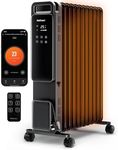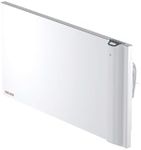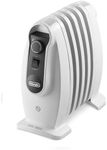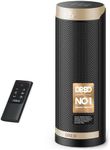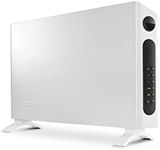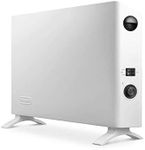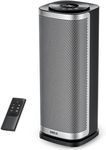Buying Guide for the Best Bathroom Heaters
Choosing the right bathroom heater can make a significant difference in your comfort, especially during the colder months. When selecting a bathroom heater, it's important to consider various factors to ensure you get the best fit for your needs. Here are some key specifications to look at and how to navigate them.Type of HeaterBathroom heaters come in different types, including wall-mounted, ceiling-mounted, portable, and underfloor heating. The type of heater is important because it affects installation, space usage, and heating efficiency. Wall-mounted and ceiling-mounted heaters are great for saving floor space and providing consistent heat. Portable heaters offer flexibility and can be moved around as needed. Underfloor heating provides even heat distribution but requires more extensive installation. Choose the type based on your bathroom size, layout, and whether you prefer a permanent or flexible heating solution.
Heating CapacityHeating capacity, measured in watts or BTUs (British Thermal Units), indicates how much heat the heater can produce. This spec is crucial because it determines how effectively the heater can warm up your bathroom. For small bathrooms, a heater with a lower capacity (500-1000 watts) may suffice. Medium-sized bathrooms might need a heater with 1000-1500 watts, while larger bathrooms could require 1500 watts or more. Assess the size of your bathroom and choose a heater with the appropriate capacity to ensure it can adequately heat the space.
Safety FeaturesSafety features are essential in bathroom heaters due to the presence of water and moisture. Look for heaters with overheat protection, which automatically shuts off the heater if it gets too hot. Tip-over protection is important for portable heaters, as it turns off the heater if it falls over. Waterproof or splash-proof designs are also crucial to prevent electrical hazards. Prioritize heaters with these safety features to ensure safe operation in your bathroom environment.
Energy EfficiencyEnergy efficiency refers to how effectively the heater converts energy into heat. This spec is important because it impacts your energy bills and environmental footprint. Look for heaters with energy-saving modes, programmable timers, and thermostats that allow you to control the temperature and reduce energy consumption. Energy-efficient heaters may have higher upfront costs but can save you money in the long run. Consider your usage patterns and opt for a heater that balances performance with energy efficiency.
Noise LevelNoise level, measured in decibels (dB), indicates how loud the heater is during operation. This spec is important for maintaining a peaceful bathroom environment. Heaters with lower noise levels (below 50 dB) are ideal for those who prefer a quiet space. If noise is not a major concern, you may have more flexibility in your choice. Consider your sensitivity to noise and the overall ambiance you want in your bathroom when selecting a heater.
Installation and MaintenanceInstallation and maintenance requirements vary depending on the type of heater. Some heaters, like wall-mounted or ceiling-mounted models, may require professional installation, while portable heaters are typically plug-and-play. Maintenance involves cleaning filters, checking for wear and tear, and ensuring the heater functions properly. Choose a heater that matches your willingness to handle installation and maintenance tasks. If you prefer minimal hassle, opt for a portable or easy-to-install model.

